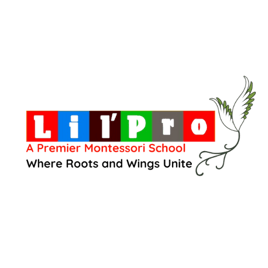
Our curriculum is based on the educational philosophy of Dr Maria Montessori, which emphasizes self-directed
learning, hand-on- activities and collaborative play. The curriculum is designed to foster independence, creativity and curiosity in children by allowing them to explore and learn at their own pace.
Here are the key components of a typical Montessori school curriculum :
1. Practical Life Skills :- Practical life activities help children to develop independence, coordination, concentration and a sense of responsibility. These activities involve real life tasks that help children care for themselves, others and their environment.
Self Care :- Learning how to dress, clean, prepare food and manage personal hygiene.
Care of the environment :- Cleaning, gardening and maintaining the classroom environment.
Grace and courtesy :- Learning social skills like greeting others, taking turns and respecting other’s space.
Fine motor Skills :- Activities like pouring, spooning, threading and using utensils to develop dexterity and coordination.
2. Sensorial Education :- Montessori’s sensorial materials help children refine their senses and learn how to categorize and describe their experiences.
Visual discrimination :- Activities involving color, size and shape to help children classify and differentiate.
Tactile exploration :- Learning through touch with materials like textured fabrics, sand paper letters and geometric solids.
Auditory discrimination :- Identifying different sounds, tones and rhythms using bells or sound cylinders.
Gustatory and Olfactory senses :- Identifying and classifying tastes and smells through various sensory exercises.
3. Mathematics :- Montessori math materials are concrete and hands- on, allowing children to develop a deep understanding of abstract mathematical concepts.
Number recognition :- Learning to recognize and sequence numbers through materials like number rods and sandpaper numbers.
Counting and quantity :- Using counters, beads and blocks to understand quantities and number relationships.
Addition, Subtraction, Multiplication and division :- Children work with materials like the golden beads to perform arithmetic operations, visualizing the concepts of carrying, borrowing and grouping.
Fractions and decimals :- Concrete materials like fraction circles help children understand the relationships between parts and wholes.
4. Language :- The Montessori Language curriculum fosters the development of vocabulary, reading, writing and communication skills through a range of activities.
Phonetics :- Children learn letter sounds through sandpaper letters and moveable alphabets, enabling them to form words and later read them.
Vocabulary Building :- Language cards and nomenclature books help children learn new words related to specific subjects like animals, plants or geography.
Writing Skills :- Children are encouraged to write through a combination of tracing, sandpaper letters and the moveable alphabet.
Reading :- After mastering phonetics, children begin reading phonic words and gradually advance to more complex sentences and stories.
5. Cultural Studies :- The Montessori culture curriculum includes geography, history, science, music, art and other subjects that help children understand the world and their place in it.
Geography :- Children learn about continents, countries and cultures through puzzle maps, globes and cultural artifacts.
History :- Introduction to timelines, historical events and the concept of time through hands on activities.
Science :- Exploring topics like botany, zoology, physics and earth science through observation, experiments and classification exercises.
Art and Music :- Children are encouraged to explore their creativity through painting, drawing, music and movement activities. Montessori art focuses on process over product.
6. Creative Arts :- In Montessori, creative expression integrate into the curriculum and seen as an essential part of the child’s development.
Art :- Children are introduced to various techniques, including painting, drawing, cutting and modeling. The focus is on creative expression, not perfection.
Music :- Children participate in singing, rhythm exercises and listening to different genres of Music. Montessori classrooms may also provide opportunities to explore instruments.
7. Physical Education :- Montessori Schools Emphasize the development of both fine and gross motor skills.
Movement activities :- Walking on a line, yoga, dancing and group games help develop coordination and balance.
Outdoor activities :- Playgrounds, nature walks, and gardening are incorporated to encourage physical activity and connection with nature.
8. Social and Emotional Development :- Montessori Education emphasizes the holistic development of the child, including emotional intelligence and social skills.
Collaboration and Community :- Children work in mixed age classrooms, encouraging mentorship, cooperation and the development of empathy.
Conflict resolution :- Grace and courtesy lessons teach children how to navigate social interactions respectfully, including resolving conflicts and expressing emotions constructively

